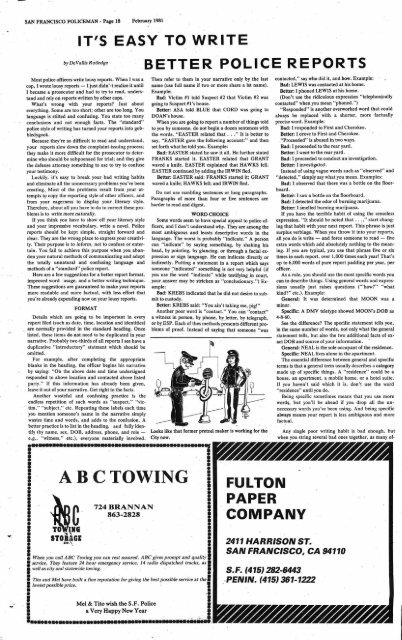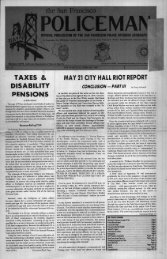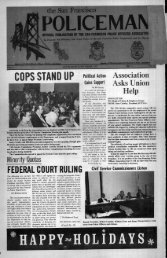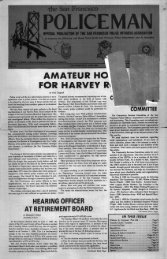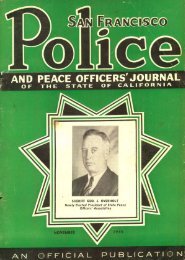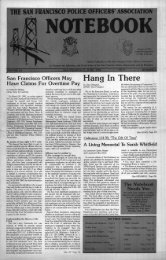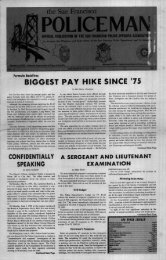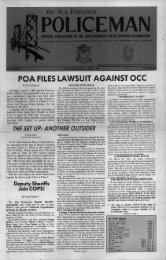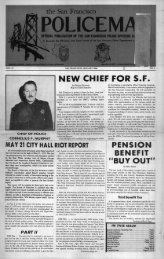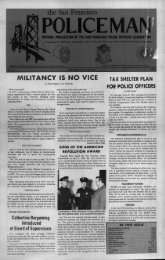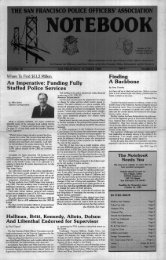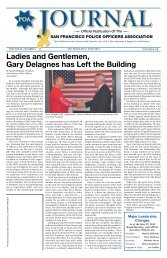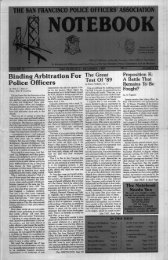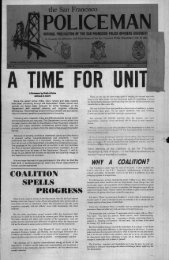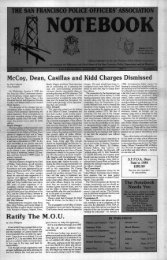February 1981 - San Francisco Police Officers Association
February 1981 - San Francisco Police Officers Association
February 1981 - San Francisco Police Officers Association
- No tags were found...
Create successful ePaper yourself
Turn your PDF publications into a flip-book with our unique Google optimized e-Paper software.
SAN FRANCISCO POLICEMAN -. Page 18 <strong>February</strong> <strong>1981</strong>IT'S EASY TO WRITEbyDeVallisRutledge BETTER P REPORTSMost police officers write lousy reports. When I was acop, I wrote lousy reports - I just didn'-t realize it untilI became a prosecutor and had to try to read, understandand rely on reports written by other cops.What's wrong with your reports? Just abouteverything. Some are too short; other are too long. Youlanguage is stilted and confusing. You state too manyconclusions and not enough facts The "standard"police style of writing has turned your reports into gobbledygook.-Because they're so difficult to read and understand,your reports slow down the complaint-issuing process;they make it more difficult for the prosecutor to determinewho should be subpoenaed for trial; and they givethe defense attorney something to use to try to confuseyour testimony.Luckily, it's easy to break your bad writing habitsand eliminate all the unnecessary problems you've beencreating.. Most of the problems result from your attemptsto copy the reporting style of other officers, andfrom your eagerness to display your literary style.Therefore, about all you have to do to correct these problemsis to write more naturally.If you think you have to show off your literary styleand your impressive vocabulary, write a novel. <strong>Police</strong>reports should be kept simple, straight forward andclear. They are the wrong place to express your creativity.Their purpose is to inform, not to confuse or entertain.You fail to achieve this purpose when you abandonyour natural methods of communicating and adoptthe totally unnatural and confusing language andmethods of a "standard" police report.Here are a few suggestions for a better report format,improved word usage, and a better writing technique.These suggestions are guaranteed to make your reportsmore readable and more factual, with less effort thatyou're already expending now on your lousy reports.FORMATDetails which are going to be important in everyreport filed (such as date, time, location and identities)are normally provided in the standard heading. Oncelisted, these items do not need to be duplicated in yournarrative. Probably two-thirds of all reports I see have aduplicative "introductory" statment which should beomitted.For example, after completing the appropriateblanks in the heading, the officer begins his narrativeby saying: "On the above date and time undersignedresponded to above location and contacted above listedparty." If this information has already been given,leave it out of your narrative. Get right to the facts.Another wasteful and confusing practice is theendless repetition of such words as "suspect," "victim,""subject," etc. Repeating these labels each timeyou mention someone's name in the narrative simplywastes time and words, and adds to the confusion. Abetter practice is to list in the heading, and fully identify(by name, sex, DOB, address, phone, and role -e.g., "witness," etc.), everyone materially involved.Then refer to them in your narrative only by the lastname (use full name if two or more share a 1st name).Example:Bad: Victim #1 told Suspect #2 that Victim #2 wasgoing to Suspect #1's house.Better: ASA told BLUE that CORD was going toDOAN's house.When you are going to report a number of things toldto you by someone, do not begin a dozen sentences withthe words. "EASTER related that . . ." It is better tosay, "EASTER gave the following, account:" and thenset forth what -he told you. Example:Bad: EASTER stated he saw it all. He further statedFRANKS started it. EASTER related that GRANTwaved a knife. EASTER explained that HAWKS fell.EASTER continued by adding the IRWIN fled.Better: EASTER said: FRANKS started it; GRANTwaved a knife; HAWKS fell; and IRWIN fled.Do not use rambling sentences or long paragraphs.Paragraphs of more than four or five sentences areharder to read and digest.WORD CHOICESome words seem to have special appeal to police officers,and I 'don't understand why. They are among themost ambiguous and leasts descriptive words in thelanguage. The worst is probably "indicate." A personcan "indicate" by saying something, by shaking hishead, by pointing, by glancing, or through a facial expressionor ,sign language. He can indicate directly orindirectly. Putting a statement in a report which sayssomeone "indicated" something is not very helpful (ifyou use the word "indicate" while testifying in court,your answer may be stricken as "conclusionary.") Example:-Bad: KREBS indicated that he did not desire to submitto custody. - -Better: KREBS said: "You ain't taking me, pig!"Another poor word is "contact." You can "contact"a witness in person, by phone, by letter, by telegraph,or by ESP. Each of thes methods presents different problemsof proof. Instead of saying that someone "wasLooks like that former pretzel maker is working for theCity now.contacted," say who did it, and how. Example:Bad: LEWIS was contacted at his home..Better: I phoned LEWIS at his home.(Don't use the ridiculous expression "telephonjcallycontacted" when you mean "phoned.")"Responded" is another overworked word that couldalways be replaced with a shorter, more factuallyprecise word. Example:Bad: I respoaded to First and Cherokee.Better: I drove to First and Cherokee. -"Proceeded" is abused in two ways.Bad: I proceeded to the rear yard.Better: I went-to the rear yard.Bad: I proceeded to conduct an'investigation.Better: I investigated.Instead of using vague words such as "observed" and"detected," simply say what you mean. Examples:Bad: I observed that there , was a bottle on the floorboard.Better: I saw a bottle on the floorboard.Bad: I detected the odor of burning marijuana.Better: I smelled burning marijuana.If you have the terrible habit of using the senselessexpression, "It should be noted that. . .," start changingthat habit with your next report. This phrase is justsurplus verbiage. When you throw it into your reports,all you do is write - and force someone to read - fiveextra words which add absolutely nothing to the meaning.If you are typical, you use that phrase five or sixtimes in each report, over 1,000 times each year! That'sup to 6,000 words of pure report padding per year, perofficer. -As a rule, you should use the most specific words youcan to describe things. Using general words and expressionsusually just raises questions ("how?" "whatkind?" etc.). Example:General: It was determined that MOON was aminor.- Specific: A DMV teletype showed MOON's .DOB as4-8-60.See the difference? The specific statement tells you,in the same number of words, not only what the generalstatement tells, but also the two additional facts of exactDOB and source of your information. -General: NEAL is the sole occupant of the residence.Specific: NEAL lives alone in the apartment.The essential difference between general and specificterms is that a general term usually describes a categorymade up of specific things. A "residence" could be ahouse, an apartment, a mobile home, or a hotel suite.If you haven't said which it is, don't use the word"residence" until you do.Being specific sometimes means that you use morewords, but you'll be ahead if you drop all the unnecessarywords you've been using. And being specific'always means your report is less ambiguous and morefactual.Any single poor writing habit is bad enough, butwhen you string several bad ones together, as many of-A B C TOWING FULTONbcTO INGSTORAGECa. \724 BRAN NAN863-2828.When you call ABC Towing you can rest assured. ABC gives prompt and qualityservice. They feature 24 hour emergency service, 14 radio dispatched trucks, aswell as city and statewide towing. -Tito and Mel have built a fine reputation for giving the best possible service at thelowest possible price.L2411 HARRISON ST.SAN FRANCISCO, CA 94110S. F. (415) 282-6443-PENIN. (415) 361-1222"I Mel & Tito wish the S.F. <strong>Police</strong>a Very Happy New Year


